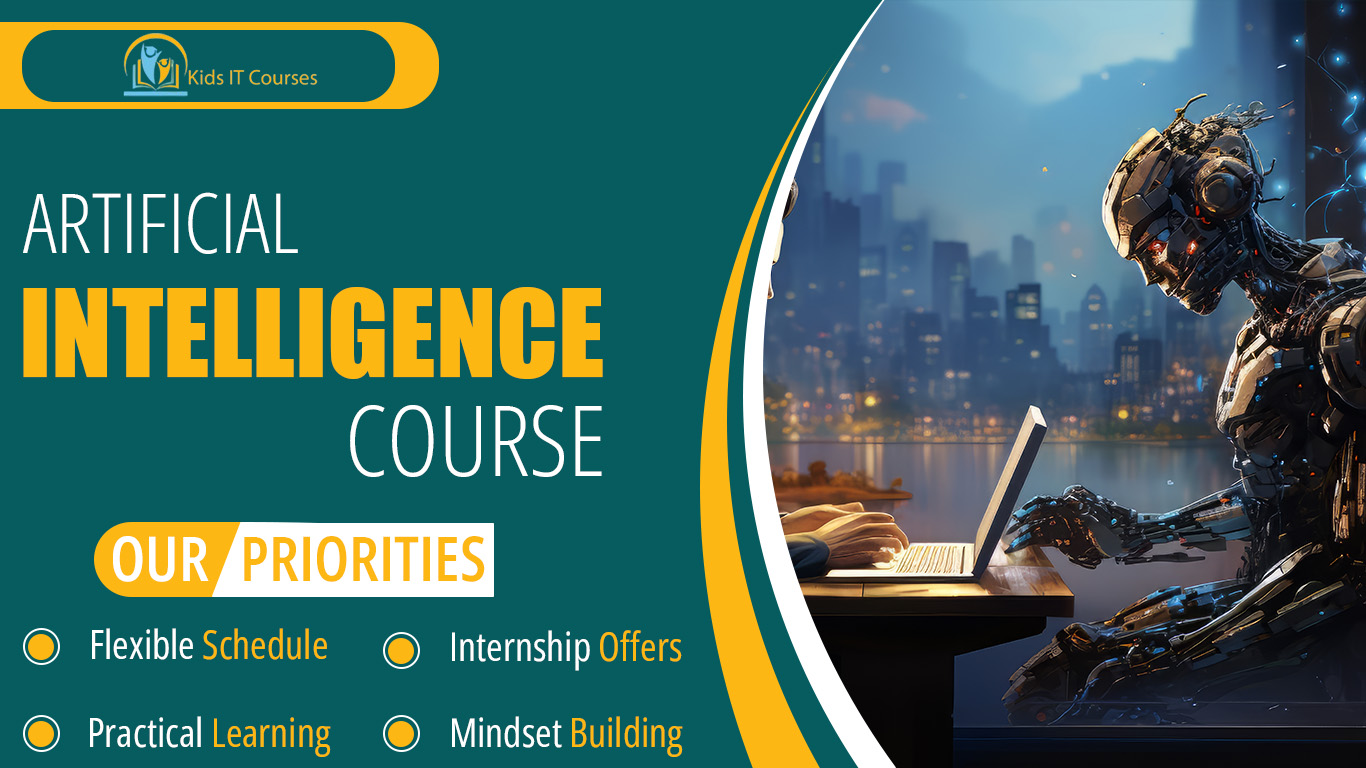
Artificial Intelligence Course for Kids
- This beginner-friendly course introduces young learners to the fascinating world of Artificial Intelligence (AI).
- From smart machines to voice assistants, AI is shaping the future — and kids can now learn how it all works! With step-by-step learning and fun examples, this course builds real tech confidence and creative problem-solving skills for curious minds.
Artificial Intelligence | Kids freelancing nearby Rawalpindi
Definition
AI teaches computers to think and act smart. It’s like giving machines a little “brain.”
Kids learn how AI helps in daily life. Like smart speakers, robots, or games.
They explore fun projects with AI tools. This makes learning exciting and creative.
AI can recognize voices, pictures, and patterns. Kids see how machines understand the world.
It shows how technology makes work easier. AI can save time and effort in many tasks.
- Kids practice solving problems using AI ideas. It builds thinking and decision-making skills.
- AI is the future of technology. This course gives kids a head start.
Importance
AI helps kids understand how smart machines work. They learn how computers can think and decide.
It makes kids ready for the future. AI skills will be needed in many jobs.
Kids can create fun AI projects. Like chatbots, games, and smart apps.
It builds problem-solving and creative thinking. Kids learn new ways to find answers.
AI teaches kids about technology around them. Like voice assistants and self-driving cars.
It improves logical and critical thinking. Kids start to think step-by-step like machines.
- AI learning makes kids smarter with technology. They understand and use it better every day.
Advantages for Freelancing Purpose
Makes kids think smart like problem solvers. They learn to find solutions in creative ways.
Helps kids understand how smart machines work. Like robots, chatbots, and self-driving cars.
Builds future job and career skills early. They get ready for tomorrow’s technology world.
Improves logical and critical thinking skills. Kids learn to make decisions step by step.
Encourages creativity with fun AI projects. Like making games or art with AI tools.
Teaches kids about real-life AI uses. In health, education, and everyday gadgets.
Gives kids a big head start in technology. They learn skills many adults are still learning.
Session 1 : What is Artificial Intelligence?
- What is AI, and how is it different from regular computer programs?
- Everyday examples of AI (Siri, Alexa, self-driving cars, Netflix recommendations)
- How AI is changing the world and making life easier
- The three types of AI: Narrow AI, General AI, and Superintelligent AI
Session 2 : How Do Machines Learn? (Introduction to Machine Learning)
- What is machine learning and how does it help computers “learn”?
- Types of machine learning: supervised, unsupervised, and reinforcement learning
- Fun activity: Create a simple learning model using pictures or objects
- Example: How YouTube learns your preferences to recommend videos
Session 3 : Working with Data
- What is data and why do computers need it to learn?
- Collecting and using data to train an AI system
- Introduction to datasets: What is a dataset? (e.g., pictures of animals, weather data, etc.)
- Mini project: Create a simple dataset for a fun AI game (e.g., sorting colors)
Session 4 : Introduction to Neural Networks
- What is a neural network?
- How neural networks work like the human brain
- The role of input layers, hidden layers, and output layers
- Fun example: How AI recognizes faces or objects in photos
- Simple activity: Teach a computer to recognize pictures of animals using a neural network
Session 5 : Building Simple AI Models (Hands-on Project)
- How to create a simple AI model using beginner-friendly tools (e.g., Google Teachable Machine, Scratch AI)
- Training a model to recognize images or sounds
- How the AI model makes predictions after learning from data
- Fun activity: Build your first image recognition app
Session 6 : AI in Games and Robotics
- How AI powers video games and robots
- How AI makes game characters smarter and more responsive
- Introduction to robotics: How robots use AI to navigate and make decisions
- Fun project: Build a simple AI game that adapts to player behavior
Session 7 : Ethical Issues and Future of AI
- What are the ethical concerns around AI? (privacy, job automation, biases)
- Can AI ever be “too smart”?
- How can we make sure AI is used responsibly?
- How will AI impact the future? (jobs, healthcare, space exploration)
Session 8 : Final Project – Create Your Own AI Game or App
- Choose from:
- AI-based image classifier
- Simple AI chat bot
- Game that adapts to user behavior using AI
- Work through each step of the project: collect data, train the model, test, and deploy
- Present your project to friends or family and explain how AI helps it work
Bonus Materials:
- AI learning resources and kid-friendly AI tools
- Printable AI glossary and cheat sheet
- Access to beginner-level AI programming languages (like Scratch, Python for AI)
- Certificate of Completion
